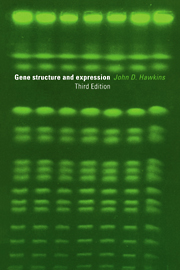Book contents
- Frontmatter
- Contents
- Introduction to the third edition
- Introduction to the second edition
- Introduction to the first edition
- List of abbreviations
- 1 Deoxyribonucleic acid (DNA)
- 2 Ribonucleic acid (RNA)
- 3 Methodology
- 4 Prokaryotic DNA replication and gene expression
- 5 The operon concept
- 6 Eukaryotic gene organisation and replication
- 7 Eukaryotic transcription
- 8 Post-transcriptional processing of RNA
- 9 Oncogenes
- 10 Haemoglobin
- 11 Proteins of the immune system
- 12 Some gene families
- 13 Mitochondrial and chloroplast genomes
- 14 Different and evolving genomes
- Glossary
- Reading lists
- Index
Introduction to the first edition
Published online by Cambridge University Press: 05 June 2012
- Frontmatter
- Contents
- Introduction to the third edition
- Introduction to the second edition
- Introduction to the first edition
- List of abbreviations
- 1 Deoxyribonucleic acid (DNA)
- 2 Ribonucleic acid (RNA)
- 3 Methodology
- 4 Prokaryotic DNA replication and gene expression
- 5 The operon concept
- 6 Eukaryotic gene organisation and replication
- 7 Eukaryotic transcription
- 8 Post-transcriptional processing of RNA
- 9 Oncogenes
- 10 Haemoglobin
- 11 Proteins of the immune system
- 12 Some gene families
- 13 Mitochondrial and chloroplast genomes
- 14 Different and evolving genomes
- Glossary
- Reading lists
- Index
Summary
There has been an explosive growth in our detailed knowledge of genetics at the molecular level over the last few years, and it is likely that accretion of new knowledge will occur at an ever increasing rate. It is therefore very difficult even for the specialist to keep abreast of all the latest ideas which rapidly progress from hypothesis to theory to accepted dogma. In the time that it takes to write a comprehensive textbook it is inevitable that new ideas will be generated and many problems in the field elucidated so that such a book will certainly be out of date before the writing is finished, let alone published. Even during the writing of this small book, over the course of a little more than a year, much new information has come to light so that were it to be re-written in the next few months, appreciable differences would appear. It does not therefore claim to be a complete guide to the subject under review; nevertheless it attempts to present ideas that are reasonably well established and at the same time to cover a fairly wide field, albeit mostly not in great depth. The selection of topics as examples of our knowledge is somewhat arbitrary and conditioned by the author's own interests and expertise.
I believe that it should be a useful book for medical students who wish to become familiar with recent ideas and techniques in molecular biology to help in understanding further advances when they arrive.
- Type
- Chapter
- Information
- Gene Structure and Expression , pp. xiii - xivPublisher: Cambridge University PressPrint publication year: 1996



